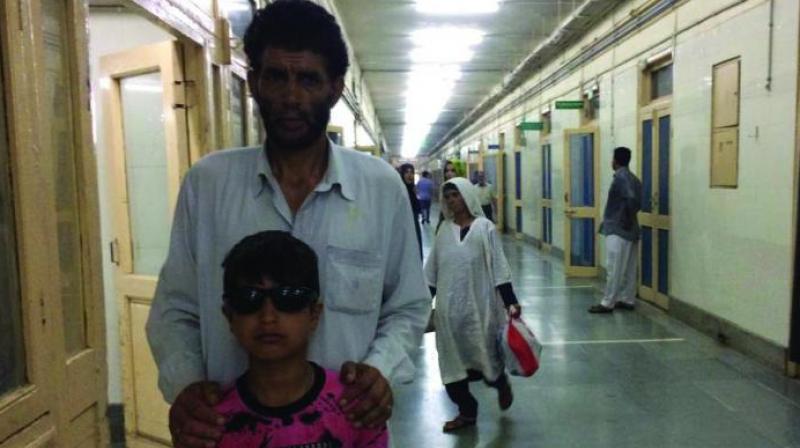Children bear brunt of stone-pelting in J&K
UT administration terms them very minor incidents.

Srinagar: It was Id-uz-Zuha. Muneefa, 4, was adamant she would go out with her father, who was stepping out to buy essentials, for a ride on two-wheeler. A resident of Safa Kadal in downtown Srinagar, she sat in front of the vehicle while her father rode to a nearby shop.
In a nearby lane, locals were protesting and, sensing danger, her father quickly turned back home when a sharp piece of stone hit her eye. A security personnel nearby, who was trying to chase away trouble makers, had used a slingshot to target the protesters. It missed the malefactors, and hit Muneefa in the eye.
This was on August 12 — when the Kashmir Valley was forced to celebrate Id under stringent restrictions.
Muneefa was admitted to the SHMS Hospital on that day and discharged on Wednesday morning. The four-year-old will now have to frequently visit doctors until her eyesight is restored.
While victims of stone pelting and pellet firing have been frequenting wards no. 7 and 8 of the SHMS here, the Jammu and Kashmir administration continues to be in the denial mode, saying these are “localised and very minor incidents” all through.
On Tuesday evening, four more Kashmiri youth, who had suffered pellet gun wounds, were discharged, clearly pointing out that all is not well in the Valley, except on main thoroughfares of Srinagar ever since the Centre abrogated Article 370.
“Muneefa suffered a deep injury in her right eye. She was in terrible pain when she was admitted. The poor child was celebrating Id but ended up in the hospital,” one of the doctors, who attended on her, told Deccan Chronicle. She was discharged but will have to come back for regular check-ups.
“She has lost her vision,” the doctor, who requested anonymity, said.
All the doctors under the Ophthalmology department have been told by their higher-ups not to interact with the media, or else face action.
Nine-year-old Mursaleen was seen sitting with his mother Ruhi in ward No. 8. Wearing black glasses, the boy was in excruciating pain even as the doctors were attending to him.
“We had gone to the market in our Alto car to buy some essentials as few shops had opened in the evening. While returning, there was heavy stone pelting and we were trapped between the stone-pelters and security forces. A boulder hurled by a protester landed on the windscreen and it was smashed completely. The glass pieces went flying around, a splinter pierced the eye of my son. Soon after the incident, we rushed him to SHMS for treatment. The doctors say he has lost vision but with surgery, they are hopeful he will regain it,” a worried Ruhi told this correspondent.
She regretted taking out her son with her to the market.
“Children have nothing to do at home and schools are closed, so they insist on coming out at any given opportunity,” she said, holding back tears of regret.
Scared doctors were not willing to disclose exact number of stone-pelting and pellet gun victims who were admitted and underwent treatment at the hospital. They say that five to 10 victims are coming in every day.
The hospital authorities have appointed the Principal of Government Medical College Dr Parvez Shah as the spokesperson but when approached, he refused to meet after being told that the information sought was regarding stone pelting and pellet gun victims.
“Over the last 10 days since the lockdown, children have been the worst affected. Since all the schools are shut, they are forced to stay at home. They have no entertainment and cannot go out to play as restrictions are in force. It is affecting the psyche of children badly as they have nothing to do. Those who ventured out, like Muneefa and Mursaleen, look what happened to them,” a senior lady doctor said.
She said that while doctors are leaving homes for work, the children are forcing them to stay back.
“At nights, the children are not able to sleep in their rooms and all families are sleeping together in one room for fear that something untoward may happen.
When we have to visit hospitals, they are adamant that we leave our jobs and stay back home. They feel that we will be safe if we stay back home”, she said.
Two more lady doctors working in the dermatology ward shared their experience with the security forces, who they alleged have been harassing them in the name of checks.
“There are 15 ambulances in the hospital. While most of the staff is unable to attend work due to restrictions, we doctors are dependent on ambulances to pick us up. But security forces who stop the ambulances at multiple checkpoints ask so many questions and check the vehicles so many times that we feel we should return home. But patients need us and therefore we are bearing with attitude security forces, who view us with suspicion,” they said.
Locals complain that though the administration has ensured that emergency services will not be affected, they find it extremely difficult to reach the hospital as security forces do not allow them easy access to the hospitals.

